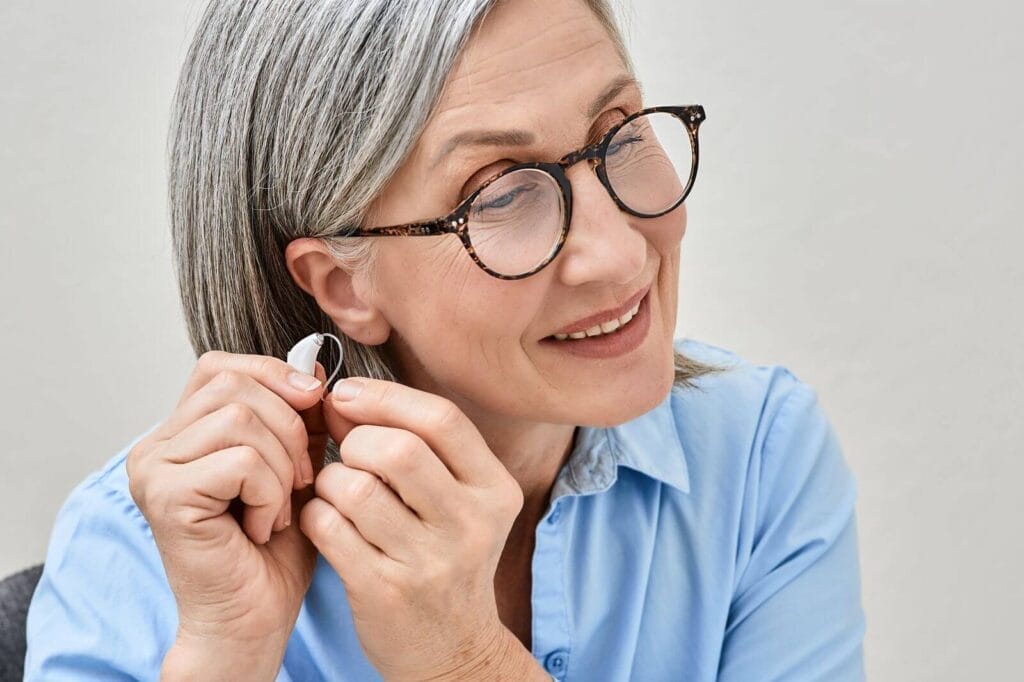
Hearing aids are essential tools that can have profound benefits on the physical and emotional well-being of people with hearing loss. These devices require some care to ensure they work correctly and last longer. Although hearing aid manufacturers design them to withstand the wear and tear of daily use, they are essentially small computers with delicate electronics that operate in rough conditions, including sweat, oil, humidity, and earwax. Proper care for hearing aids will ensure good functioning, extend the life of your investment, and minimize the need for repairs. Here, we go over some basic details about caring for hearing aids.
Daily handling and general care for hearing aids
As mentioned above, hearing aids are built to withstand daily use, but environmental factors will eventually affect your device, especially if you don’t handle and care for them well. Here are some tips for keeping your hearing aids safe from the elements.
Hearing aids have coatings that repel moisture and dust, but all electronic devices will fail if exposed to too much water and debris. Do not wear hearing aids in the shower or while swimming. Wear a hat or use an umbrella in heavy rain to keep your hearing aids from getting wet. If they get wet, immediately remove the batteries (if they are disposable) and place the hearing aids in a hearing aid dehumidifier.
You can purchase several models of dehumidifiers online or from hearing care professionals. Some are small jars containing drying beads. You first activate the beads in a microwave and then place your hearing aids in the jar overnight to remove moisture. Other dehumidifiers are small electronic boxes that circulate air to dry out the hearing aids overnight.
Hair products can also negatively affect your hearing aids. Always allow hair sprays and gels to dry completely before wearing your hearing aids. Hair sprays often contain chemicals that damage or degrade hearing aid plastics.
Never leave your hearing aids in the car, especially in hot weather, as high temperatures can melt plastic and damage electronics. Use a hearing aid dehumidifier regularly to remove moisture from your device and to prevent damage in hot or cold temperature extremes.
When not wearing your hearing aids, store them in their charger (if they are rechargeable) or inside the case provided by your hearing care professional. Do not leave hearing aids where young children or pets can reach them. If a child accidentally swallows hearing aid button batteries, call the button battery ingestion hotline at 1-800-498-8666 or go to the emergency room.
Find the Best Hearing Aids For You!
Hearing aid cleaning and maintenance
Cleaning and maintenance methods for your hearing aids likely depend on the model. Your hearing care professional will show you specific details of how to care for your model. You should also receive care manuals from the manufacturer. Be sure to inspect and clean your aids daily as per the instructions from your hearing care professional. Doing so will ensure that they work correctly and last longer.
In general, most hearing aids require a small brush to remove wax and debris from the microphones and the ports where the sound comes out. Use a lint-free cloth to wipe wax off the aids gently. Do not use alcohol wipes, as alcohol damages plastic over time.
Many hearing aids have wax traps covering the sound outlet ports to prevent wax from entering them. When they become blocked with wax, these traps need to be changed. Your hearing care professional will show you how to do this properly.
Hearing aid batteries
Care for hearing aid batteries is another important component of hearing aid upkeep and maintenance. Different models use different types of batteries, so be sure to discuss the details with your hearing care professional.
Many hearing aids come with rechargeable batteries that can last a few days on one charge. Charge your batteries regularly to ensure you don’t lose power at an inopportune time. As with all rechargeable batteries, they will eventually stop holding a charge. The lifetime of your rechargeable batteries depends on the model, usage, and other elements. When they stop holding a charge, you will have to contact the manufacturer for replacement batteries.
If you use disposable batteries, their lifetime (typically between four and 10 days) depends on your hearing aid model, the battery size, and the demands of your particular program settings. If you use wireless features or Bluetooth, batteries will drain faster. You can often purchase batteries more cheaply online (try Amazon or Microbattery.com) than at hearing aid dealers or drugstores. Talk with your hearing care professional about which battery brands they find more reliable.
Disposable hearing aid batteries have an expiration date listed on the package. Each battery in the package also has a small round sticker to prevent it from activating and losing power. If you remove the sticker from the battery and let it sit on a table, it will lose all power in a couple of weeks, even if you don’t use it in a hearing aid. Remove the sticker only when you are going to place the battery into a hearing aid. After you remove the sticker, air enters the battery and activates it. Wait two minutes after removing the sticker for the battery to fully activate before putting it in your hearing aid.
Common issues and troubleshooting
If your hearing aids are not working or sound weak, you most likely have a dead battery or earwax blocking the sound. Make sure your batteries are fully charged (if rechargeable), or try a fresh battery (if disposable). Then check to ensure wax is not blocking the areas of the hearing aids where sound comes out. Also clear any earwax from the hearing aid microphones.
Properly fitted hearing aids should not whistle or feed back, as modern hearing aids have feedback cancellation algorithms. If you hear feedback, you most likely have not fully inserted your hearing aids, allowing sound to leak out of your ears. Earwax buildup can also cause feedback. If pushing the aids into your ears and thoroughly cleaning them does not solve the problem, consult with your hearing care professional to ensure the proper functioning of the hearing aids.
Hearing aid repairs
If your hearing aids need repair, contact the office where you purchased them. Hearing aids usually come with a factory warranty that covers repairs, loss, and damage for two to three years. Details will depend on the manufacturer and your hearing care professional’s contracts. There may be separate fees for repairs and troubleshooting that your professional provides in the office.
Care for hearing aids
Although highly beneficial, hearing aids can be a significant investment. Proper care can help protect your investment while sustaining the many benefits they provide. With the proper daily care and maintenance, you can ensure that your hearing aids function well and last as long as possible.








